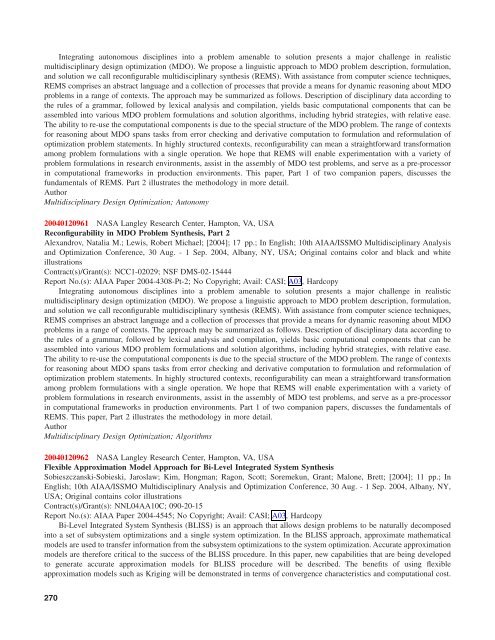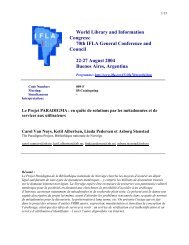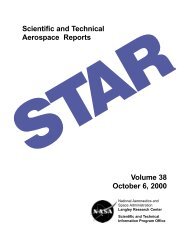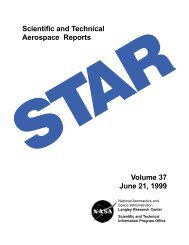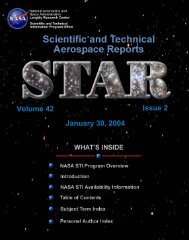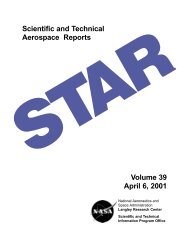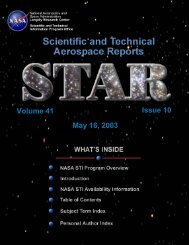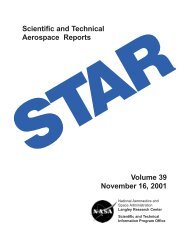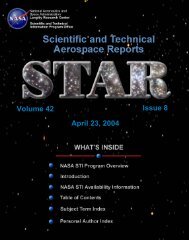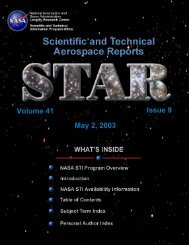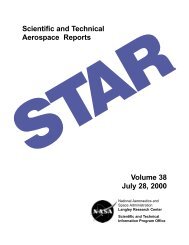NASA Scientific and Technical Aerospace Reports
NASA Scientific and Technical Aerospace Reports
NASA Scientific and Technical Aerospace Reports
Create successful ePaper yourself
Turn your PDF publications into a flip-book with our unique Google optimized e-Paper software.
Integrating autonomous disciplines into a problem amenable to solution presents a major challenge in realistic<br />
multidisciplinary design optimization (MDO). We propose a linguistic approach to MDO problem description, formulation,<br />
<strong>and</strong> solution we call reconfigurable multidisciplinary synthesis (REMS). With assistance from computer science techniques,<br />
REMS comprises an abstract language <strong>and</strong> a collection of processes that provide a means for dynamic reasoning about MDO<br />
problems in a range of contexts. The approach may be summarized as follows. Description of disciplinary data according to<br />
the rules of a grammar, followed by lexical analysis <strong>and</strong> compilation, yields basic computational components that can be<br />
assembled into various MDO problem formulations <strong>and</strong> solution algorithms, including hybrid strategies, with relative ease.<br />
The ability to re-use the computational components is due to the special structure of the MDO problem. The range of contexts<br />
for reasoning about MDO spans tasks from error checking <strong>and</strong> derivative computation to formulation <strong>and</strong> reformulation of<br />
optimization problem statements. In highly structured contexts, reconfigurability can mean a straightforward transformation<br />
among problem formulations with a single operation. We hope that REMS will enable experimentation with a variety of<br />
problem formulations in research environments, assist in the assembly of MDO test problems, <strong>and</strong> serve as a pre-processor<br />
in computational frameworks in production environments. This paper, Part 1 of two companion papers, discusses the<br />
fundamentals of REMS. Part 2 illustrates the methodology in more detail.<br />
Author<br />
Multidisciplinary Design Optimization; Autonomy<br />
20040120961 <strong>NASA</strong> Langley Research Center, Hampton, VA, USA<br />
Reconfigurability in MDO Problem Synthesis, Part 2<br />
Alex<strong>and</strong>rov, Natalia M.; Lewis, Robert Michael; [2004]; 17 pp.; In English; 10th AIAA/ISSMO Multidisciplinary Analysis<br />
<strong>and</strong> Optimization Conference, 30 Aug. - 1 Sep. 2004, Albany, NY, USA; Original contains color <strong>and</strong> black <strong>and</strong> white<br />
illustrations<br />
Contract(s)/Grant(s): NCC1-02029; NSF DMS-02-15444<br />
Report No.(s): AIAA Paper 2004-4308-Pt-2; No Copyright; Avail: CASI; A03, Hardcopy<br />
Integrating autonomous disciplines into a problem amenable to solution presents a major challenge in realistic<br />
multidisciplinary design optimization (MDO). We propose a linguistic approach to MDO problem description, formulation,<br />
<strong>and</strong> solution we call reconfigurable multidisciplinary synthesis (REMS). With assistance from computer science techniques,<br />
REMS comprises an abstract language <strong>and</strong> a collection of processes that provide a means for dynamic reasoning about MDO<br />
problems in a range of contexts. The approach may be summarized as follows. Description of disciplinary data according to<br />
the rules of a grammar, followed by lexical analysis <strong>and</strong> compilation, yields basic computational components that can be<br />
assembled into various MDO problem formulations <strong>and</strong> solution algorithms, including hybrid strategies, with relative ease.<br />
The ability to re-use the computational components is due to the special structure of the MDO problem. The range of contexts<br />
for reasoning about MDO spans tasks from error checking <strong>and</strong> derivative computation to formulation <strong>and</strong> reformulation of<br />
optimization problem statements. In highly structured contexts, reconfigurability can mean a straightforward transformation<br />
among problem formulations with a single operation. We hope that REMS will enable experimentation with a variety of<br />
problem formulations in research environments, assist in the assembly of MDO test problems, <strong>and</strong> serve as a pre-processor<br />
in computational frameworks in production environments. Part 1 of two companion papers, discusses the fundamentals of<br />
REMS. This paper, Part 2 illustrates the methodology in more detail.<br />
Author<br />
Multidisciplinary Design Optimization; Algorithms<br />
20040120962 <strong>NASA</strong> Langley Research Center, Hampton, VA, USA<br />
Flexible Approximation Model Approach for Bi-Level Integrated System Synthesis<br />
Sobieszczanski-Sobieski, Jaroslaw; Kim, Hongman; Ragon, Scott; Soremekun, Grant; Malone, Brett; [2004]; 11 pp.; In<br />
English; 10th AIAA/ISSMO Multidisciplinary Analysis <strong>and</strong> Optimization Conference, 30 Aug. - 1 Sep. 2004, Albany, NY,<br />
USA; Original contains color illustrations<br />
Contract(s)/Grant(s): NNL04AA10C; 090-20-15<br />
Report No.(s): AIAA Paper 2004-4545; No Copyright; Avail: CASI; A03, Hardcopy<br />
Bi-Level Integrated System Synthesis (BLISS) is an approach that allows design problems to be naturally decomposed<br />
into a set of subsystem optimizations <strong>and</strong> a single system optimization. In the BLISS approach, approximate mathematical<br />
models are used to transfer information from the subsystem optimizations to the system optimization. Accurate approximation<br />
models are therefore critical to the success of the BLISS procedure. In this paper, new capabilities that are being developed<br />
to generate accurate approximation models for BLISS procedure will be described. The benefits of using flexible<br />
approximation models such as Kriging will be demonstrated in terms of convergence characteristics <strong>and</strong> computational cost.<br />
270


